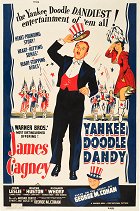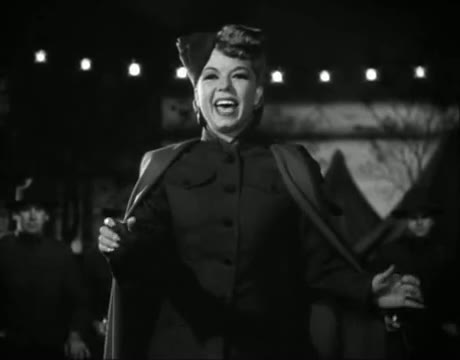Réalisation:
Michael CurtizScénario:
Robert BucknerPhotographie:
James Wong HoweActeurs·trices:
James Cagney, Joan Leslie, Walter Huston, Richard Whorf, Irene Manning, George Tobias, Rosemary DeCamp, Jeanne Cagney, Frances Langford (plus)Résumés(1)
Actor and songwriter George M. Cohan is impersonating President Franklin D. Roosevelt in the musical show I'd Rather Be Right , by George S. Kaufman and Moss Hart, when he is summoned to meet the president at the White House. In response to the president's questions, George tells him the story of his life: George was born on the Fourth of July, 1878 to Jerry and Nellie Cohan, a pair of vaudeville actors. A short time later, his sister Josie is born and soon the family is touring the country as "The Four Cohans." The family gets a big break when they are hired to star in Peck's Bad Boy . At thirteen, George, the star of the play, is a success, but his self-importance is responsible for losing the Cohans several bookings. Several years later, George, now a young man, meets aspiring singer Mary when he is playing the part of an old man and she comes backstage to ask his sage advice about breaking into show business. The Cohans and Mary, who soon learns George's real age, go to New York, where George tries to sell the songs he has written. When he learns that The Four Cohans are losing work because of his reputation for imperious behavior, he pretends that his play has been sold so that the others will accept a booking without him. Later, in a bar, George overhears Sam H. Harris talking with Schwab, a potential backer, and offers him his new musical, Little Johnny Jones . Sam and George become partners and produce a number of plays that feature George's popular formula of success stories laced with patriotism. In the meantime, George proposes to Mary, Josie becomes engaged, and the older Cohans buy a farm and retire. It is the end of The Four Cohans and George takes this opportunity to write Popularity , a serious play. It fails miserably, but news of its failure is wiped out of the papers by the sinking of the Lusitania by the Germans in 1915. When the U.S. enters the war, George tries to enlist, but at thirty-nine, is too old to be a soldier. Unable to fight, George writes the inspirational song "Over There." After World War I, Cohan writes more shows. Josie and Nellie die and then George's father Jerry dies. Feeling his age, George dissolves his partnership with Sam so that he and Mary can take a much-needed rest. They travel to Europe and Asia, and end up on the Cohan farm. George pretends to enjoy his life, but he hates being out of the limelight. After a group of teenagers see George reading Variety and think that the headline "Stix Nix Hix Pix" is a form of jive talk, George realizes how much he still wants to be performing and gladly accepts Sam's offer to star in I'd Rather be Right . The president has listened quietly to George's story and now presents him with the Congressional Medal of Honor for his songs "Over There" and "It's a Grand Old Flag." George is the first actor to receive this honor, and he responds as he used to when he was with The Four Cohans, "My mother thanks you; my father thanks you; my sister thanks you; and I thank you." When George leaves the White House, a parade of soldiers and a band march by singing "Over There," and George proudly joins them. (texte officiel du distributeur)
(plus)Critiques (1)
James Cagney might deserve a better rating and it would probably be appropriate to take into account the time when it was filmed, but this is still a heavily promotional film that sometimes has a bit too much pathos. However, James Cagney displays his mastery. Truly an excellent actor. It's just that the film itself is not that great.
()

